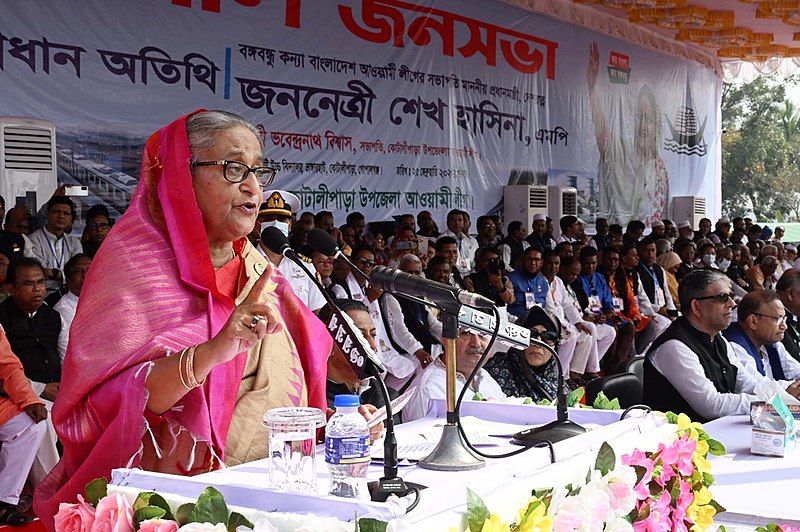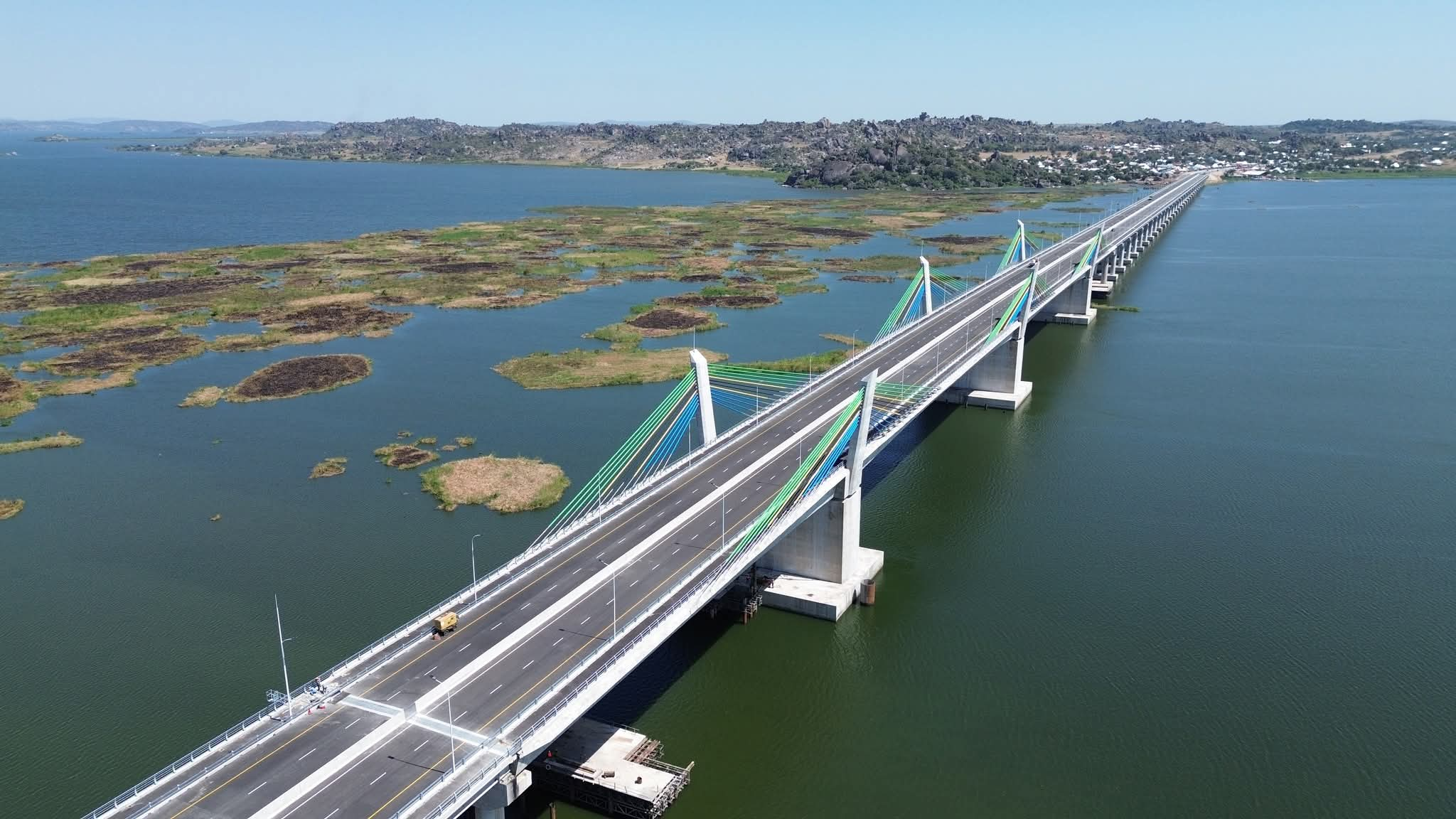BANGLADESH PROTEST: How Longest Serving PM Sheikh Hasina Wazed Became Unpopular

Did you know that Bangladesh Prime Minister Sheikh Hasina Wazed is the tenth prime minister (the longest serving PM) and the daughter of Sheikh Mujibur Rahman, the founding father and first president of Bangladesh?
Bangladesh, officially known as the People's Republic of Bangladesh, is a country in South Asia and is the eighth-most populous country in the world with a population of nearly 170 million in an area of 148,460 square kilometres (57,320 sq mi). The country shares land borders with India to the north, west, and east, and Myanmar to the southeast, while to the south it has a coastline along the Bay of Bengal, narrowly separated from Bhutan and Nepal by the Siliguri Corridor, and from China by the mountainous Indian state of Sikkim in the north.
Dhaka, the capital and largest city, is the nation's political, financial, and cultural centre, while Chittagong is the second-largest city and is the busiest port on the Bay of Bengal. The official language of Bangladesh is Bengali while Bangladeshi English is also used in the government and official documents alongside Bengali.
Bangladesh protests began in 2022, snowballing into a series of protests against the Sheikh Hasina government between 2022 and 2024. Anti-government protests broke out in Bangladesh on 10 December 2022, initiated by the Bangladeshi opposition, which vowed to continue protests despite "autocratic" crackdown. This protests which remained low-level witnessed some vandalisation in November and December 2023. Later on July 2024, this protest accelerated to the quota reform movement and finally the non-cooperation movement.
In the December 2022 protests, tens of thousands marched in Dhaka demanding the resignation of Prime Minister of Bangladesh, Sheikh Wazed Hasina. The protests were linked to rising commodity costs and inflation as a result of the Russian invasion of Ukraine. More violence escalated during October and November 2023, resulting in 2 killed on 28 October, while political violence gripped the country as election loomed.
Hasina, born 28 September 1947, is the tenth prime minister of Bangladesh whose reign began from June 1996 to July 2001 and again from January 2009 to August 2024. She is the daughter of Sheikh Mujibur Rahman, the founding father and first president of Bangladesh. Having served for a combined total of over 20 years, she is the longest serving prime minister in the history of Bangladesh. Her premiership came to an end following her exile in August 2024 after a series of violent protests.
On her ascendency to Prime Minister, Hasina, then leader of the Awami League (AL), lost the 1991 election to Khaleda Zia, with whom she had collaborated against the autocratic regime of Hussain Muhammad Ershad. As leader of the opposition, Hasina accused Zia's Bangladesh Nationalist Party (BNP) of electoral dishonesty and boycotted Parliament, which was followed by violent demonstrations and political turmoil. Zia resigned to a caretaker government, followed by Hasina becoming prime minister after the June 1996 election.
While the country began to experience economic growth and a reduction in poverty, it remained in political turmoil during her first term, which ended in July 2001, with Hasina being succeeded by Zia following her victory. This was the first full five-year term for a Bangladeshi prime minister since it became an independent country in 1971.
During the 2006–2008 political crisis, Hasina was detained on extortion charges. After her release from jail, she won the 2008 election. In 2014, she was re-elected for a third term in an election that was boycotted by the BNP and criticised by international observers.
In 2017, after nearly a million Rohingya entered the country, fleeing genocide in Myanmar, Hasina received credit and praise for giving them refuge and assistance. She won a fourth and fifth term after the 2018 and 2024 elections, which was marred by violence and widely criticised as being fraudulent.
It has been widely considered that under her premiership, Bangladesh experienced democratic backsliding. Human Rights Watch documented widespread enforced disappearances and extrajudicial killings under her government. Many politicians and journalists were systematically and judicially punished for challenging her views. In 2021, Reporters Without Borders gave a negative assessment of Hasina's media policy for curbing press freedom in Bangladesh since 2014.
Domestically, Hasina has been criticised as being too close to India, often at the cost of Bangladesh's sovereignty. She is seen as a manifestation of India's interference in Bangladeshi politics, which the critics described as the main source of Hasina's power.
Among the controversies that dogged her reign as PM include the Padma Bridge graft scandal which involved the ruling Awami League government that allegedly sought, in exchange for the awarding of the construction contract, a large amount of money from the Canadian construction company SNC-Lavalin. Though the allegations were subsequently found to be false and without merit, and a Canadian court subsequently dismissed the case, the World Bank pulled out of a project to provide funding for the Padma Bridge, citing corruption concerns. The bridge was eventually constructed with the government's own funds and was inaugurated in June 2022 at a cost of ৳30,193.39 crore (US$3.6 billion), much higher than the original projected cost of ৳10161.75 crore (US$860 million).
In 2018, Hasina's government passed the controversial Digital Security Act, 2018, under which any criticism deemed inappropriate by the government over the internet or any other media could be punished by prison terms of various degrees. This was heavily criticised both domestically and internationally for suppressing people's freedom of speech, as well as undermining press freedom in Bangladesh.
In December 2022, the Hasina government ordered the closure of 191 websites accused of publishing "anti-state news" citing intelligence reports. Dhaka district authorities ordered the closure of Dainik Dinkal, which is owned by Tarique Rahman of the Bangladesh Nationalist Party (BNP). Dinkal appealed the order to the Bangladesh Press Council who dismissed their appeal in February 2022, resulting in its closure. The move has been criticised by government opponents who claim the move is an attempt to stifle opposition to the government. The government claimed Dinkal violated articles 10, 11, 16, 21(1)(kha) of the Printing Presses and Publications (Declaration and Registration) Act, 1973 as it had irregular publication and its publisher was a convicted felon.
In June 2024, Hasina paid a state visit to New Delhi, during which Bangladesh and India signed ten bilateral agreements, including one on allowing India a rail corridor to its northeastern states through Bangladeshi territory. This led to widespread criticism in Bangladesh on the issue of the country's sovereignty, accusing Hasina of "selling the country to India".
Hasina was among Time's 100 most influential people in the world in 2018, and was listed as being one of the 100 most powerful women in the world by Forbes in 2015, 2018, and 2022. She was the world's longest-serving female head of government until August 4, 2024, when she resigned and fled the country amidst growing protests.
#penglobalfactfile #Bangladesh #protest


_1755775186.jpg)
